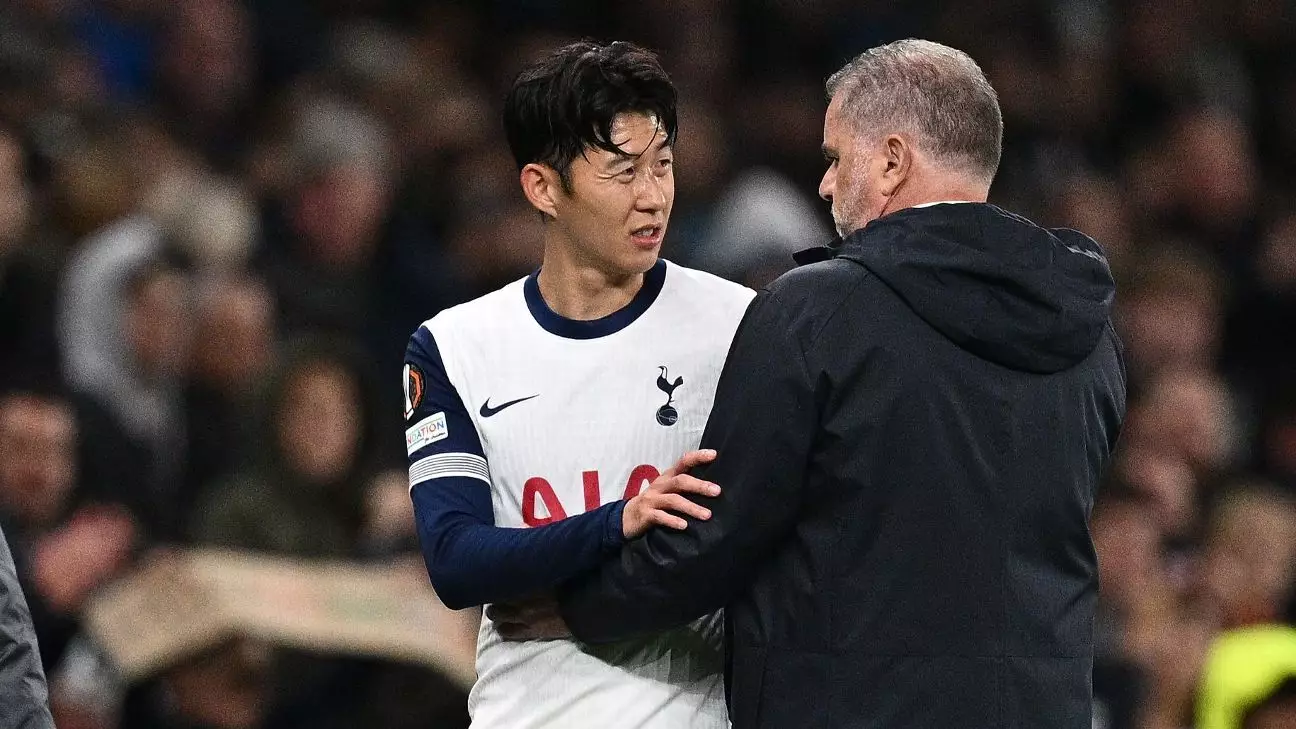The world of elite football has transformed over the years into a grueling landscape where players are expected to perform consistently at their peak while managing an intense fixture schedule. One player who epitomizes this struggle is Son Heung-Min, the South Korean star who has mesmerized fans at Tottenham Hotspur since his arrival in 2015. However, as the demands of the game increase, both club coaches and fans must consider the sustainability of allowing Son to carry such a heavy load at the age of 32.
Ange Postecoglou, Tottenham’s current gaffer, recently acknowledged the unsustainable nature of Son’s frequent appearances, especially following a Europa League match against Qarabag that saw Son limping off the pitch due to “fatigue in his hamstring.” Despite having made 415 appearances for Spurs, the number of games is beginning to take a toll on the talented forward’s physical condition. The reality is that as players age, the risk of injury looms larger, which raises the question of whether or not it is feasible for Son to feature in every match.
Son himself has commented on the burdensome fixture schedule facing modern footballers, emphasizing the potential for injuries. With the physical strain of both club and international play, it’s clear that elite athletes are being stretched to their limits. This begs the question: when does competitiveness become detrimental to a player’s longevity?
Postecoglou hinted at a strategic approach to managing Son’s involvement early in the season. The coach had hoped to ease Son’s workload given the surplus of matches; however, injuries to teammates such as Richarlison and Dominic Solanke have necessitated more time on the pitch for the South Korean. Proper planning would ensure that players do not endure excessive fatigue, emphasizing the importance of squad depth. In an ideal scenario, Son’s contributions could be complemented by other players, allowing him crucial periods of rest.
It is not merely a matter of relying on Son’s sheer talent and work ethic; it is also about leveraging the resources available within the club. A team’s ability to rotate players effectively can mitigate injury risks and prolong the careers of its top performers.
Son stands as a beacon of hope and pride for South Korea, making his commitment to the national team unwavering. Postecoglou revealed that he would never request Son to resign from international duty, as he understands how vital representing one’s country is to a player’s career and legacy. This dimension complicates the club’s strategy of managing player fatigue, as National Team calls further stretch Son’s already demanding schedule.
Postecoglou’s belief in allowing players to make personal decisions about their careers underscores a broader philosophy regarding player agency. Amid the ruthless nature of professional football, choices about participation and rest should often lie with the players themselves—especially when it comes to the emotional significance of representing one’s country.
While Postecoglou’s acknowledgment of the broader responsibility to protect a player’s wellbeing is commendable, it’s vital to remember that each player’s situation is unique. Son may thrive under the pressure of constant competition, finding purpose in challenging himself, but the hand of fate can be unrelenting. Injuries can derail both a player and their team’s ambitions, breaching the delicate balance between pushing limits and preserving physical integrity.
Moreover, it is crucial that coaching staff remain vigilant. Leadership in a football environment also involves making tough decisions. For Postecoglou, choosing to prioritize Son’s health over short-term competitive advantage illustrates a conviction that prioritizes long-term benefits both for the player and the club.
Son Heung-Min’s situation at Tottenham Hotspur serves as a microcosm for the challenges facing elite athletes today. As they navigate the landscape of relentless competition, the interplay between club demands, international commitments, and personal aspirations necessitates a sophisticated approach to player management. Coaches like Postecoglou must find a way to honor a player’s competitive soul while safeguarding their physical and emotional well-being. The journey of balancing these often conflicting responsibilities will be crucial not just for Son’s career, but for the longevity of elite players in the dynamic world of football.

